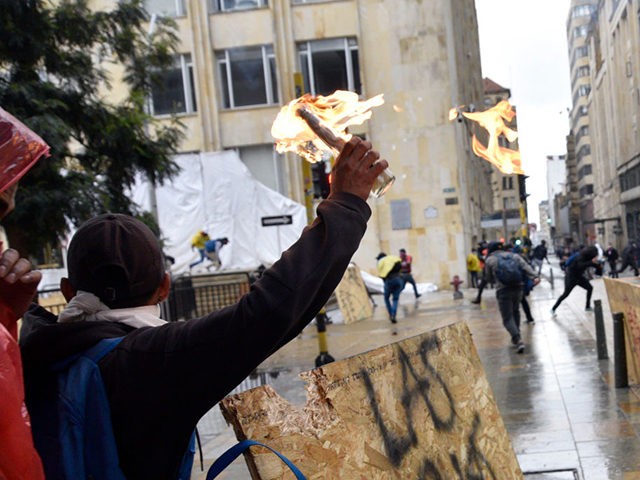Armed robbers in Colombia targeted several shipments of medical and humanitarian aid to areas devastated by leftist riots on Wednesday, jeopardizing the country’s Chinese coronavirus response.
Colombia has endured two weeks of what leftist groups have dubbed a “national strike,” in which members of unions, indigenous groups, and others on the political left have organized road blockades and police station attacks against the government of conservative President Iván Duque. The protests were initially dubbed a response to Duque’s attempts to promote a progressive nationwide tax hike, but the national outcry resulted in Duque dropping the plan almost immediately. Groups participating in the strike have not issued any clear demands to the government as of Thursday in exchange for ending the violence.
The “national strike” comes at a time in which Colombia has soared to the top of the ranks of most affected countries by the Chinese coronavirus pandemic. Colombia surpassed 3 million coronavirus cases as of Thursday and is inching towards documenting 80,000 deaths since the pandemic began in late 2019. Experts are predicting a surge in coronavirus cases following nearly two weeks of leftist riots.
Colombian officials confirmed that, on Wednesday, an armed gang attacked a caravan carrying Chinese coronavirus and renal medical supplies — including antibiotics, sedatives, and other medications — in Cali, one of the cities most devastated by the leftist riots. The caravan, consisting of 15 vehicles, was reportedly carrying 500 tons of medical supplies into the city, which has experienced significant shortages of medicines and basic goods since the strikes began impeding traffic on major highways. Assailants slashed the tires on the vehicles to prevent them from moving forward, authorities said, then unclasped the trailers carrying supplies on the trucks and stole them away. Local reports indicated that protesters were present for the attack, though law enforcement authorities have yet to confirm that the attackers were formally part of the “national strike” or simply taking advantage of the blockades.
El Tiempo, one of Colombia’s largest newspapers, noted that a similar attack occurred against a medical mission in Cali proper; the trucks attacked Wednesday had not yet reached their destination.
The governor of Valle del Cauca, where Cali is located, issued a statement Wednesday urging vandals to allow medical convoys peaceful passage, arguing that they or their relatives may also need medical attention and fail to receive it because of these crimes.
“The call is to respect humanitarian corridors and to understand that health belongs to everyone, that today it could be one of your loved ones, a person close to you,” Governor Clara Luz Roldán said, addressing the robbers. “Someone suffering a difficult situation who is needing some of these medications that with so much urgency we need to make sure arrive at their destination.”
“Humanitarian corridors are a right respected during all protests, in all confrontations,” she added. “Where these types of conflicts exist, humanitarian corridors always respect anything to do with health, ambulances.”
El Tiempo relayed the news on Thursday of a similar robbery in northern Sucre, this time targeting health workers at a vaccination site. Four armed robbers reportedly attacked the health workers while they were attempting to transport vaccine doses by the Chinese firm Sinovac Biotech, stealing 41 doses and a large number of syringes and personal belongings of their victims. The vaccine doses were meant for senior citizens in the town of Chaparral. The incident did not immediately appear to have any relation to ongoing riots.
The crime wave continued in coastal Barranquilla, according to the Colombian news network RCN, where mobs of hooded vandals attacked residential neighborhoods with Molotov cocktails during a soccer game at a nearby stadium. The exchange of firebombs and tear gas from the police was so massive that the two teams playing in the game, Argentine teams River Plate and Junior, had to suspend the game for several minutes to wait for the fumes to clear.
Cali, outside of which the caravan robbery occurred, has experienced over a week of violent attacks on its police stations, vandalism of historical sites and statues, and armed threats to residential communities. Roadblocks organized by rioters have caused major supply shortages not just in hospitals, but in supermarkets and other stores stocking basic goods. Local officials told the Colombian El País that the “humanitarian corridor” brokered with the rioters have resulted in the arrival of some basic foodstuffs, but restoring supply has been slow and locations that have especially wanted items available, like potatoes, are reportedly seeing price increases of as much as 30 percent.
Some grocers expressed to El País concerns for the future regarding potential meat shortages.
“What is worrisome isn’t the current situation, but what could happen in the future,” one market owner said. “For example, now you can get chicken, but that is all that the firms have in their inventory; those inventories run out and that’s when we’ll begin to see the problem.”
While unions and indigenous groups have taken the lead in publicity for the “national strike,” the Colombian government has stated it has evidence that Marxist terrorist organizations are involved in the effort.
“We have determined that [involved in] the disorder and vandalism occurring in Cali in last days there are structures tied to drug trafficking, the ELN, and FARC dissidents,” Attorney General Francisco Barbosa Delgado said last week. The Revolutionary Armed Forces of Colombia (FARC) and National Liberation Army (ELN) are both communist, narco-terrorist organizations.

COMMENTS
Please let us know if you're having issues with commenting.